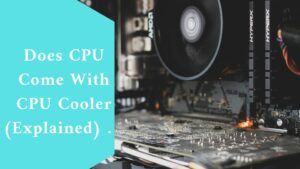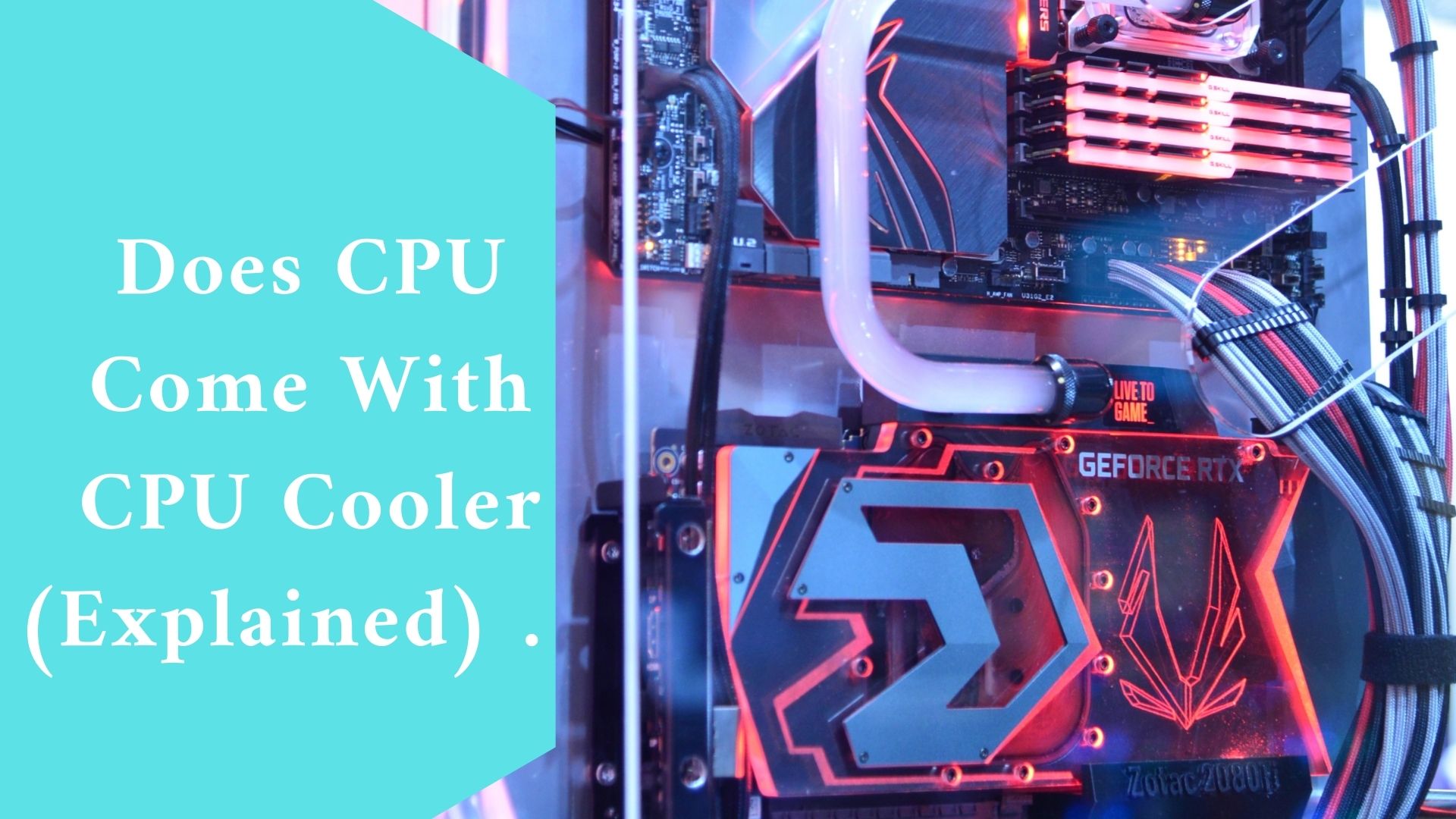Of them, some do. The majority of CPUs at the higher end of the power spectrum typically lack any kind of heatsink.
It would be a waste of resources to include a stock CPU cooler when you need to purchase a powerful CPU cooler to operate the CPU at reasonable temperatures because they produce so much heat (your CPU’s TDP).
The goal of CPU producers is to create high-quality CPUs, not high-quality CPU cooling.
However, the majority of midrange and lower CPUs do ship with stock CPU cooling.
That’s because they’ll mostly still function properly with a stock CPU cooler, even if they might be used more effectively when paired with a powerful CPU cooler.
The goal of CPU producers is to create high-quality CPUs, not high-quality CPU cooling..
But the question is Do You need a CPU Cooler? When in doubt, almost always you do need a CPU Cooler. When you don’t use one, you run the danger of harming, slowing, or even ruining your CPU.
But let’s look at a few particular queries:
Does upgrading your CPU require upgrading your CPU cooler as well?
That is dependent on two inquiries.
- How effective is the old CPU cooler?
- Can you use your old CPU cooler with your new CPU?
There is absolutely no reason for you to upgrade your CPU cooler if you currently own, say, a Noctua NH-D15 or a similarly potent CPU cooler, and the CPU you’re upgrading to hasn’t undergone a significant enough change in physical format to require a different mounting system from the CPU cooler.
A good CPU cooler should generally last you far longer than a CPU and shouldn’t need to be replaced with every CPU upgrade.
There are two requirements to fulfill to ensure compatibility between your old CPU cooler and your new motherboard:
- Check the compatibility of your new CPU Socket with your old CPU Cooler. Your CPU Cooler’s product page will list compatible Sockets.
- Thermal Design Power (TDP) of the CPU Verify that the CPU cooler you currently have is capable of cooling your new CPU. While it’s safer to leave some headroom, it’s typically as simple as matching your CPU’s TDP to the cooler’s maximum TDP.
The majority of midrange and lower CPUs do ship with stock CPU cooling
If you don’t overclock, do you still need a liquid CPU cooler?
No. A good heatsink and fan cooler from a respected brand would perform better than most liquid cooling solutions for less money, so it wouldn’t be wise to invest money in a liquid CPU cooling solution.
Not to add that they have fewer failure spots due to having fewer moving parts.
Even now, liquid cooling for CPUs has a use. You might have to exercise caution due to space limitations. There may be a place for an AIO or custom liquid CPU cooling system.
But typically no. A liquid CPU cooler is not required.
If you don’t gain from a liquid CPU cooling solution in some other aspect except performance, you don’t need one (Physical limitations in the case, just plain liking liquid cooling, etc).
If you don’t overclock, do you still need a CPU cooler?
Yes. Regardless of whether you overclock or not, a CPU cooler is required, whether it is stock or third-party.
If your computer boots at all, it will shut down due to a thermal shutdown as the CPU very quickly achieves dangerously high temperatures during even moderately demanding processes.
Therefore, your CPU must have a cooling of some kind.
Is your CPU Strong Enough For Your Stock CPU Cooler?
It varies. Do you utilize a low-power CPU with a high thermal design point (TDP) for routine operations like web browsing?
Then your stock CPU cooler is probably more than adequate for your needs, so the answer is yes.
Do you have a powerful CPU that you utilize to perform intricate computations, create intricate scenes, or play graphically demanding games?
Then no, your stock CPU cooling probably won’t be sufficient. With CPUs at this level, you most likely won’t even get a stock cooling.
To get an idea of what you might want for a CPU like that, look at our Best Low Profile CPU Coolers or our Best CPU Coolers for AMD Ryzen Threadripper CPUs.
In any case, a Stock CPU Cooler is capable of cooling the CPU it came with for straightforward tasks, but it may fall short of complex ones.
Since CPU performance is temperature-dependent, colder CPUs operate more quickly. Therefore, a better CPU Cooler will help you perform better to some extent.
Yes, very likely if you only use your CPU for basic things. No, unless you perform a lot of CPU-intensive things.
You should look into purchasing an excellent aftermarket CPU cooler, in my opinion.

How Long Can a CPU Function Without a CPU Cooler?
It’s a little challenging to respond to your question because, in modern PCs, the motherboard checks to see if a CPU cooler with functional fans is fitted before the machine even powers on.
Therefore, your motherboard does not specifically check for a CPU cooler (heatsink, radiator).
It assumes that you had the common sense to install a CPU cooler along with it and only checks to see whether you have a functioning fan connected to the proper input.
When you boot the computer after tricking your motherboard into believing you had a CPU cooler attached, nothing would happens; the computer would start normally.
Most likely, your system will boot through to your operating system and then some.
The only time the CPU temperature will increase and the computer will perform a thermal shutdown to keep the CPU from melting itself is when you attempt to run software that even moderately uses the CPU.
Consequently, your CPU wouldn’t likely die from that, but it is extremely unwise and will significantly shorten the CPU’s total lifespan.
Can your CPU function flawlessly without a CPU cooler?
It is conceivable, but extremely unwise, as stated in the answer to the preceding question.
Your CPU will certainly sustain permanent harm if you do this.
In conclusion, no, please don’t. Your CPU will suffer harm.
Can A CPU function without a fan for how long?
This is dependent on the kind of CPU and cooler you have.
You might be able to run the CPU without ever attaching a fan to the heatsink if it’s a lower-end CPU with low TDP and you have a large radiator.
However, to make it simpler for cool air to reach the heatsink, make sure your case is well-ventilated or remove the side panel from your case.
Final thought
These are just a few of the queries I’ve encountered regarding CPU coolers that have stumped users when they choose to fix their computers.
Please let us know if there are any additional subjects you would like us to cover.

